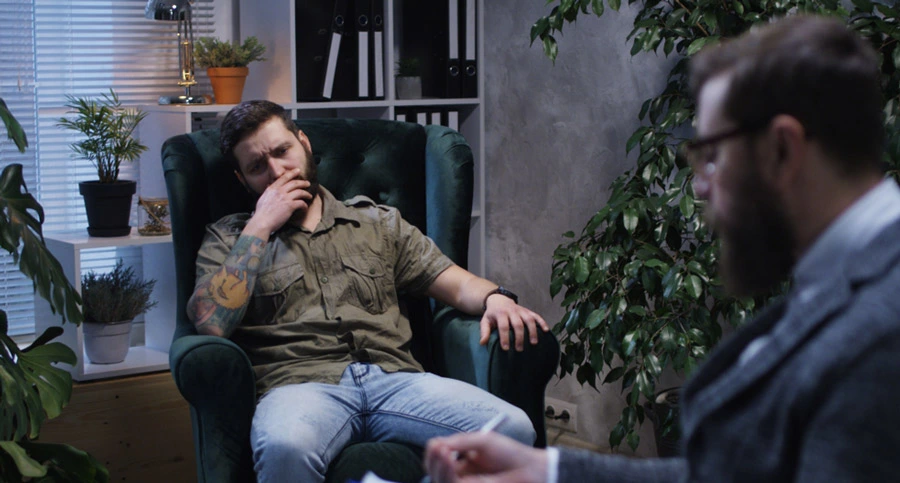Understanding the Options for Getting a Loved One Treatment
Navigating the path of addiction and recovery can be an emotionally charged journey, especially when a loved one fails to recognize their need for help. This often leads to the question: Can you force someone to go to rehab in Arizona? The state’s laws concerning involuntary commitment to substance abuse treatment are nuanced, requiring careful interpretation.
Keep reading to learn more about these regulations and clarify whether it is legally possible – and a good idea – to compel someone into seeking treatment at a rehabilitation center in Arizona.
Contact Catalina Behavioral Health for help with involuntary treatment for substance use disorders, and keep reading to learn about mandated programs and recovery options for your loved one now!
24 Hour Detox and Rehab Helpline
Involuntary Commitment Laws in Arizona
In Arizona, if someone is resisting help for a mental illness or addiction issues, it’s critical to understand how involuntary commitment laws work. It’s helpful to know that this is often referred to as a civil commitment.
Any responsible adult aged 18 or above can initiate an involuntary evaluation for another person if the person poses serious harm to themselves or a threat to others due to these concerns. The applicant, which could be family members, a case manager, or any other community participant, is required to document the factual basis for the evaluation and explain why the individual is unable or unwilling to undergo treatment without a court directive.
This requires a showing of recent behavior that is considered a substantial risk and appropriately explaining why they’re evading treatment.
Application is Filed and Third-Party Assessment is Done
Once the application for involuntary evaluation is filed, a behavioral health screening agency commences its assessment of the patient’s condition within 48 hours.
If their findings suggest that voluntary drug or alcohol rehab suffices or that treatment isn’t required at all, this initial screening will conclude with no further actions taken.
In opposition to drug court and other court ordered rehab directives, involuntary commitment laws and regulations similar to the Marchman Act and Drug Services Act can help someone into rehab who is a harm to themselves or others as defined by the state of Arizona.
Application for Court Ordered Evaluation

However, if the decision states that the patient needs further mandated treatment, an Application for Court Ordered Evaluation will be lodged with the court. Upon approval, the order will be executed by local law enforcement authorities, taking the patient in for court-ordered evaluation.
Depending on the circumstance, the patient’s evaluation could be conducted either within a healthcare facility or community setting. To safeguard the dignity and rights of the patient involved in this process, an attorney is swiftly appointed to represent them.
In extreme cases where the individual is an immediate danger to themselves or others, an emergency admission can be done.
Following this court order, at least two physicians must conduct an evaluation within a span of 72 hours. They have the authority to recommend a course of treatment, but the patient still has the right to refuse it at this point.
Force Someone To Go To Rehab: Hearing Scheduling and Evidence
If treatment is recommended, a hearing will be scheduled, at which point the evaluating doctors will present evidence showcasing the severity of the patient’s mental health issues or substance use disorder, corroborated by two additional witnesses and evidence presented by the original petitioner.
Court Decision is Made Regarding Addiction Treatment and Mental Health Services
Upon conclusion of the hearing, if the Court finds compelling evidence showcasing a necessity for treatment and a clear inability on the part of the individual to participate voluntarily, it can order inpatient or outpatient treatment. Additionally, medications can also be included in the treatment plan.
A patient could potentially be mandated to stay in treatment for up to 365 days, depending on the circumstances.
For instance, if a patient exhibits self-threatening behaviors, they can receive up to 90 days of intensive in-patient court-ordered rehab. Similarly, those deemed hazardous towards others or being categorized under persistent acute disability are liable for an extended period of inpatient care lasting up to 180 days.
In cases where the person is assessed to be severely impaired, court-ordered treatment could last for up to one year.
The Issues With Forcing Someone To Undergo Substance Use Disorder Treatment

While it’s clear that in some cases forcing someone to undergo addiction treatment might be needed to save their life, it can still cause certain issues.
Resentment and Resistance to Addiction Treatment
This decision may cause significant resentment or resistance towards treatment as it wasn’t a voluntary choice. For some, this could end up compromising the effectiveness of the recovery process.
Feelings of Punishment
Additionally, being forced into alcohol or drug rehab might instill feelings of punishment rather than rehabilitation, further causing a person to withdraw from treatment instead of entering with an open mind.
The Risk of Relapse and Drug Overdose
When someone is forced to participate in substance abuse rehab at treatment centers, there could be a risk of relapse as soon as they get out, as the person does not have an intrinsic motivation to get the help they need. This can lead to overdose, as many people who stop using drugs for a short time and then go back to using end up overdosing, sometimes fatally.
Get Treatment Options for a Loved One Now!
Why Court Ordered Drug Rehab is Often Helpful
When you consider forcing someone into drug addiction treatment, it’s understandable if you question its effectiveness. However, believe it or not, even involuntary rehab can be beneficial in a variety of ways.
First, forced treatment helps the person detox from harmful substances safely under medical supervision. Ongoing drug and alcohol abuse can threaten one’s physical health, and the process of detoxing can also be harmful. With professional help – even if it’s against the person’s wishes – you can ensure that your loved one will be safe.
Additionally, involuntarily entered rehab programs provide evidence-based therapies geared toward understanding the root causes of addiction and learning healthier coping mechanisms to handle life stressors moving forward.
Evidence-Based Therapies for Support
Therapeutic interventions like cognitive behavioral therapy (CBT), EMDR, and group counseling sessions provide vital coping mechanisms for lasting recovery. These therapies help to address underlying mental health issues which often play an integral role in addiction; this significantly reduces the risk of relapse and helps facilitate long-term sobriety.
Even if someone enters rehab reluctantly at first, they will still gain knowledge about their condition and pathways towards recovery which might inspire voluntary continuation in later stages.
It can also be helpful to try to figure out how to motivate someone to want to change and go to rehab.
When Is It Right To Try To Force Someone To Go to Rehab?

Determining whether to force someone into rehab for a substance use disorder or other mental health issue is a very personal decision, often influenced by many factors. Look for extremes in behavior or indications that your loved one’s life – or the lives of those around them – are in danger due to substance use.
Here are some questions that can help determine if a professional alcohol intervention is needed.
Are they neglecting everyday responsibilities such as school, work, or their own health? If there are neglected children or dependent adults involved who suffer from this person’s addiction, court-ordered treatment, and involuntary commitment might be necessary.
Consider also if efforts for voluntary treatment failed before: has your loved one been repeatedly unsuccessful at maintaining sobriety despite their own, self-motivated attempts? If so, they may feel like it’s time to give up and aren’t willing to get treatment. However, Catalina has had considerable success in treating clients with extensive histories of chronic relapse, and hope is never lost.
Get Proven Treatment Options for Support
Even Chronic Relapse Can be Overcome
It’s never too late. Just because someone didn’t stay sober after going to treatment once, twice, or even ten times, doesn’t mean this last time won’t be the one that finally makes them stick with it.
Finally, and importantly, is violent behavior linked to their addiction? Is there physical harm occurring either towards themselves or others when under the influence? If so, it’s critical to try to get your loved one help as soon as possible, even if it’s court-mandated.
Before making any decisions, it can be beneficial to reach out to professionals familiar with Arizona’s involuntary commitment laws for mental health and substance abuse, including therapists and lawyers experienced in this field. They’ll tell you how best to proceed based on both legalities and what’s emotionally/physically suitable.
Get Help at Catalina for Your Loved One Today

While it may feel counterintuitive to have someone involuntarily committed, limited research supports that even patients admitted to rehab under duress can attain successful outcomes just as those entering voluntarily do. Ultimately, exposure plays a crucial part since it allows them to gain insights into their addiction’s detrimental impacts while offering tools for transformation toward healthier lifestyle choices.
If you need help with a person suffering from mental health disorders and/or addiction, we’re here for you. Contact Catalina Behavioral Health today to speak with our team about the best way to approach your loved one and get them the help they need.
All calls to our facility are completely confidential, so please reach out now to get options to help support your loved one!



